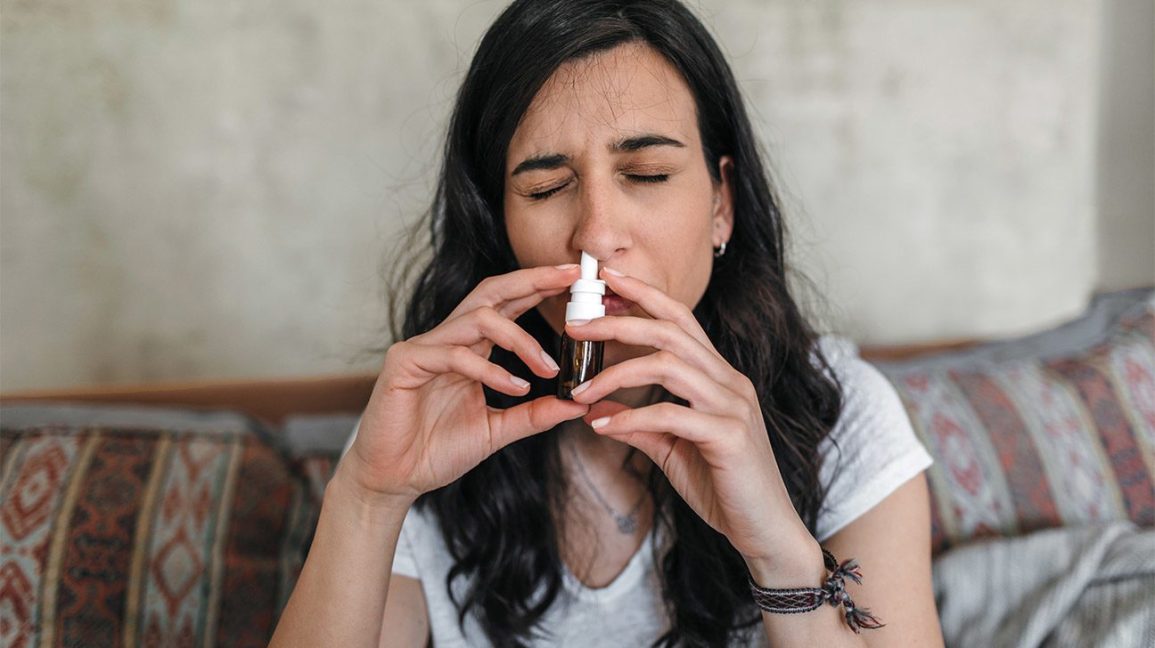
- Rebound congestion is when the medication squeezes blood from your nasal tissues.
- This can happen if you over-rely on nasal sprays like Afrin when you have a cold.
- Experts say using steam and saline to soothe your nose when sick may be a better long-term option.
Nasal congestion is a popular seasonal ailment, and nasal decongestant sprays can seem like an effective solution. But doctors are warning people to use the bottle sparingly.
Why all the caution? Nasal decongestant sprays can cause rhinitis medicamentosa, which is also known as rebound congestion. In short, this occurs when the medication squeezes blood from your nasal tissues. It seems like you can breathe again, but the relief wears off. Then blood, oxygen, and nutrients flood back into the area and patients can feel even more congested.
Dr. Amber Luong, an associate professor at The University of Texas McGovern Medical School and director of research for the American Rhinologic Society board of directors, explained that rebound congestion can occur when people use nasal sprays constantly.
“The medication causes decreased blood supply to the nose, and it tries to compensate by increasing blood supply to the nose. In addition, there is a decrease in the receptors that the medication targets, making it such that you need more medication to breathe normally,” Luong explained.
Luong said there are several mechanisms that make nasal decongestants cause rebound nasal congestion. Blood vessels are regulated by a balance of sympathetic and parasympathetic nerves that have a yin-yang type of relationship. When sympathetic nerves are activated, nasal lining swelling decreases (vasoconstriction) and it feels like you can breathe easily. When parasympathetic nerves are activated, the nasal lining swells (vasodilation) and causes congestion.
Some nasal decongestants stimulate norepinephrine, which acts on the sympathetic nerves. The decongestants can affect the body’s norepinephrine so much that when you stop taking it the parasympathetic system reacts and leads to swelling of nasal lining. As a result, you get more congested.
“Nasal decongestant sprays are directly irritating to the nasal lining and hence cause inflammation, resulting in direct swelling of the lining and hence congestion,” Luong explained.
Nasal decongestant sprays shouldn’t be used for more than 3 days in a row.
“Patients who use nasal decongestants sprays for longer than 3 days continuously run the risk of developing rebound congestion,” Luong noted.
Dr. Anthony Del Signore, director of rhinology and endoscopic skull base surgery at Mount Sinai-Union Square, agreed. In a 2018 interview, he told Healthline that nasal decongestants, such as Afrin, can be used for symptomatic relief for 2 to 3 days. He said they should never be used for a longer time frame.
Do nasal decongestant pills cause rebound congestion? Yes, Luong said. They have the same mechanism of action as nasal decongestant sprays and are associated with more side effects.
“Rebound nasal congestion typically [is] associated with topical nasal decongestants, but can happen with some oral nasal decongestants,” Luong said.
Luong explained that topical nasal decongestants can be very helpful if you have an upper respiratory infection with significant nasal congestion. “They are very effective if nasal congestion is preventing one from falling asleep,” she noted.
Also, they can be useful for people with recurring nose bleeds.
But some people should avoid nasal decongestant pills and sprays all together.
“Patients with high blood pressure and heart disease should be cautious when using nasal decongestant sprays. The nasal decongestants work by causing vasoconstriction of blood vessels, which decrease swelling in the nose and improve nasal breathing. However, these sprays can also increase blood pressure,” she noted.
Nasal decongestants (pills and sprays) in general can add additional strain on the heart in people with thyroid disease (either overactive or underactive thyroid gland) — as that already stresses the heart. “The combined use of synthetic thyroid hormone with a nasal decongestant, especially in someone with pre-existing heart disease, can be dangerous,” Luong said.
Men with an enlarged prostate also known as benign prostate hypertrophy should also stay clear of nasal decongestants. They often have difficulty urinating, and the medications can cause the urine bladder neck and possibly the sphincters to close down.
Useful, fast acting alternatives to nasal decongestants include warm steam and saline sprays, as well as sleeping more upright. “The warm steam helps to thin out mucus and soothes the nasal lining that both contribute to nasal congestion. Also, saline sprays along with sleeping upright helps also to thin out mucus and decrease blood congestion of the nasal vessels,” Luong said. Exercise can also help if you’re up for it, she added.
It can take a few days, but nasal steroid sprays and combined with nasal antihistamines (in someone suffering from allergic rhinitis) can help decrease nasal inflammation and decrease nasal mucus production, and that will decrease nasal congestion, Luong explained.
All medications have side effects, so Luong said people should look at other remedies.
“If these alternatives are not sufficient, nasal decongestants can be a very effective medication to decrease nasal congestion, but be sure to use it judiciously and for sure to limit its use to no more than 3 consecutive days,” she said.
